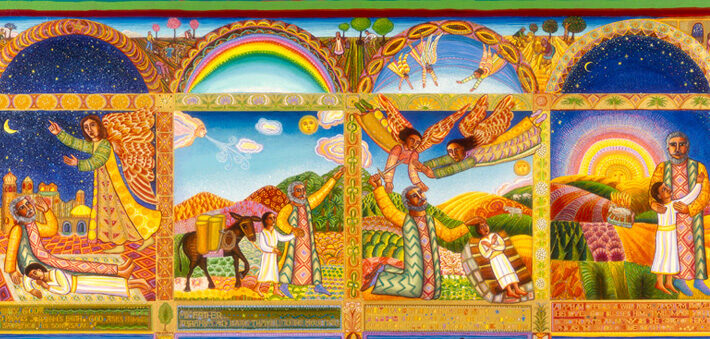Commentary on Matthew 10:40-42
Here is the passage for the anonymous disciple, the one who does hard work but is hardly ever recognized.
This passage continues the trajectory of the mission directives at the start of Matthew 10. Preceding our passage are practical instructions on how to conduct the mission (verses 5-10), how to deal with mixed reception (verses 11-15), the promise of rejection and suffering (verses 16-23), the security of discipleship (verses 24-31), and the nature of the division which obedience to Jesus entails (verses 32-39).
Today’s little passage, verses 40-42, circles back around to the question of reception.
Where there is a parallel with this passage, in verse 40, we notice that Mark (9:37) and Luke (9:48) both refer to welcoming a child in Jesus’ name as equivalent to welcoming Jesus. But Matthew is unique, leaving out a reference to “little one” until verse 42. Here instead, Jesus says “whoever welcomes you welcomes me.” The tight connection between Jesus and his apostles, established at the very beginning of the mission instructions (10:5-8), appears once more. To welcome Jesus, is to welcome the one whom he has sent, and to welcome the one he has sent is to welcome the Messiah himself.
But our passage takes the question of reception further: How does reception of the apostles by others relate to the reception of Jesus whom they preach? To what degree is hospitality itself an indication of discipleship?
Jesus answers these questions with a string of clauses beginning “the one who…” (loves, verse 37; does not take up a cross, verse 38; finds, loses, verse 39). In our passage, the phrasing continues with “the one who receives…” (verses 40-41). Verbs of hospitality — “receive” is used six times, “take” is used twice — dominate these three verses. The hospitable treatment of one of Jesus’ servants earns one the reward typically reserved for the servant himself or herself. Those who supply the apostles’ work also deserve compensation. These are in some sense hypothetical clauses, not talking about anybody in particular. Instead, they highlight potential action and the positive and negative categories associated with this action.
By verse 42, however, we encounter a stronger conditional statement: “whoever would give even a cup of cold water to one of these little ones in the name of a disciple … none of these will lose their reward.” The emphasis in this final verse falls on the potential concrete action of a disciple, not merely on going out and proclaiming. The passage cannot help but recall the more famous words in Matthew 25:40: “Truly I tell you, just as you did it [fed, quenched, clothed, nursed, visited] to one of the least of these who are members of my family, you did it to me.”
The rawness of Jesus’ words here should not be lost on us–simply a cup of water in the name of a disciple–and one’s reward is vouchsafed forever. The reward is not simply for the preachers and prophets among us but also for those whose calling is simply to pour the drinks and play the host(ess).
It is one of the great temptations in mission to think of it only or even primarily in terms of great missionaries of the past. We are drawn to heroic figures and their visible exploits. But as Paul especially was fond of reminding us, the body is comprised of interdependent parts that cannot function alone (1 Corinthians 12), even if some members are given credit out of proportion to their value to the whole. That is to say, the great missionaries tend to be over-recognized rather than overrated, and their support teams who make the mission possible through prayer, planning, and financial support are so often undervalued.
In his book Tipping Point, Malcom Gladwell popularized insights of social network theory in a chapter entitled “The Power of the Few.”1 He refers especially to the work of “social connectors and mavens” who enable the development of complex networks of people and ideas. In a movement like Christianity, such individuals were and are critical of its spread to the ends of the earth. It comes as no surprise, then, that Jesus takes time to emphasize the reception of the apostles in their mission.
The divine mission is as much about the unnamed people who provide a thirsty servant a cold drink of water as the familiar names that dot the pages of church histories. In fact, within the New Testament, we only have one narrative account of the church’s mission — the book of Acts — and in it we encounter many such “minor” characters. They are minor only in the sense that their contributions to God’s mission surely surpass the “air time” they receive: people like Ananias (the good one!), Simon the Tanner, Cornelius, Lydia, Prisca/Aquila, Sergius Paulus, and so on. Their hospitality and social connections were decisive for the spread of the Christian “Way.”
It may be an unconscious prejudice of historically clergy-dependent traditions that we tend to discount the roles of such people as somehow less missional. This would be a mistake and Jesus’ words represent a kind of prophetic rebuke. To understand God’s mission, and how the church reflects that mission, we need to celebrate the cupbearers of cold water. Those who hospitably receive the Lord’s emissaries may be just as influential if not more so in the spreading of God’s Kingdom. “None of these,” Jesus tells us, “will lose their reward” (10:42).
Jesus concludes his mission instructions with an implied invitation to all those “anonymous” saints who occupy our churches: you may not be the ones going, but never forget you too are sent.
Notes:
1. Malcom Gladwell, Tipping Point (Boston: Back Bay Books, 2002): pp. 30-88.


July 2, 2017